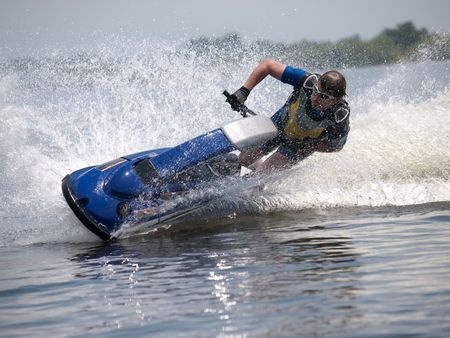Personal Watercraft Popular, But Dangerous
April 11, 2016 | Category: Boating Accidents | ShareThe U.S. Coast Guard reported that in 2014 (latest available statistics) PWCs (personal watercraft) were involved in 30 percent of all reported boating accidents. In these accidents there were 592 injuries and 34 deaths.
Miami-Dade police found a man in March 2015 who had been killed after he and some friends were riding jet skis after sunset. Police said the man was not wearing a life vest.
In May 2014, according to the Florida Fish and Wildlife Conservation Commission, a 25-foot Hydrasport and a PWC were involved in a boating accident near Monument Island in Miami. The PWC operator made a sharp U-turn toward the Hydrasport which resulted in the Hydrasport’s striking the PWC. The PWC operator was ejected, suffered injuries and was taken to the hospital.
What are PWCs?
 A PWC is a boat less than 16 feet in length that uses an internal combustion motor powering a water jet pump as its primary source of propulsion. It is designed to be operated by a person sitting, standing, or kneeling. Personal watercraft are better known to the public by brand names that include Jet Ski®, Sea Doo®, Wave Runner®, Tiger Shark®, Wet Jet®, etc., according to FishandBoat.com. They are different from many conventional boats because of their design, operation and use. PWCs are capable of speeds which exceed 65 mph and are highly maneuverable.
A PWC is a boat less than 16 feet in length that uses an internal combustion motor powering a water jet pump as its primary source of propulsion. It is designed to be operated by a person sitting, standing, or kneeling. Personal watercraft are better known to the public by brand names that include Jet Ski®, Sea Doo®, Wave Runner®, Tiger Shark®, Wet Jet®, etc., according to FishandBoat.com. They are different from many conventional boats because of their design, operation and use. PWCs are capable of speeds which exceed 65 mph and are highly maneuverable.
Since they are affordable, easy to use and have relatively low transportation and maintenance costs, PWCs have increased in number in the United States. In 2014 alone, there were over 47,900 PWCs sold in the United States according to Statista.com, a website statistics portal.
Injuries from PWC accidents
University of Florida research shows that jet ski accidents cause far greater injury than other boating accidents. Some of the injuries sustained are closed-head injuries, trauma to the chest, and abdominal injury from riding jet skis. Most of the jet ski accidents occur with jet ski riders colliding with an object or another water vehicle. When this happens, jet ski riders are usually ejected. The university study suggested that jet ski accident injuries are similar to motorcycle accident injuries.
Causes of PWC accidents
Accident statistics show that the causes of PWC accidents include:
- Speeding
- Swerving without checking for oncoming traffic
- Not looking ahead
- Entering restricted areas designated for swimming
- Bad weather
- Choppy surf
- Reckless or careless operation
- Inexperienced operators
- Operating while under the influence of drugs or alcohol
- Collisions
- Groundings in shallow water
- Low visibility
Florida regulations regarding PWCs
Under Florida law, a personal watercraft is considered a motorboat. It must be registered, and operated under all the rules that other boaters must follow.
- Operators are required to carry safety equipment, which includes life preservers and fire extinguishers.
- Each person operating, riding on, or being towed behind a personal watercraft must wear an approved non-inflatable personal flotation device.
- The operator of a personal watercraft must attach the engine cutoff switch lanyard to his/her person, clothing or PFD (personal floating device).
- Personal watercraft may not be operated from 1/2 hour after sunset to 1/2 hour before sunrise, even if navigation lights are used.
- Maneuvering a personal watercraft by weaving through congested vessel traffic, jumping the wake of another vessel unreasonably close or when visibility around the vessel is obstructed, or swerving at the last possible moment to avoid collision is classified as reckless operation of a vessel (a first-degree misdemeanor).
- A person must be at least 14 years of age to operate a personal watercraft in Florida.
- A person must be at least 18 years of age to rent a personal watercraft in Florida.
- Anyone born on or after January 1, 1988 is required to either have successfully completed a National Association of State Boating Law Administrators (NASBLA) approved boating education course or have passed a course equivalency or temporary certificate.
Compensation for PWC injuries
There are a variety of different forms of compensation that victims of PWC accidents may receive. These include:
- Reimbursement of lost compensation
- Reimbursement of future wages
- Payment for medical expenses, present and future
- Pain and suffering
- Loss of quality of life
- Punitive damages
In addition, the owner of the PWC, which may be a rental company, or the manufacturer should there be a defect, may also be liable for damages.
“Personal watercraft are often a source of fun and exercise; however, they may also be dangerous. When involved in a serious PWC accident, please contact the expert team at Spivey Law Firm, Personal Injury Attorneys, P.A.,” said Collier County Jet Ski Attorney, Randall Spivey.
Collier County Boating Accident Attorney, Randall L. Spivey is a Board Certified Trial Attorney – the highest recognition for competence bestowed by the Florida Bar and a distinction earned by just one (1%) percent of Florida attorneys. He has handled over 2,000 personal injury and wrongful death cases throughout Florida. For a free and confidential consultation to discuss your legal rights, contact the Spivey Law Firm, Personal Injury Attorneys, P.A., in Lee County at 239.337.7483 or toll free at 1.888.477.4839,or by email to Randall@SpiveyLaw.com. Visit SpiveyLaw.com for more information. You can contact Spivey Law Firm, Personal Injury Attorneys, P.A.in Charlotte County at 941.764.7748 and in Collier County 239.793.7748.

